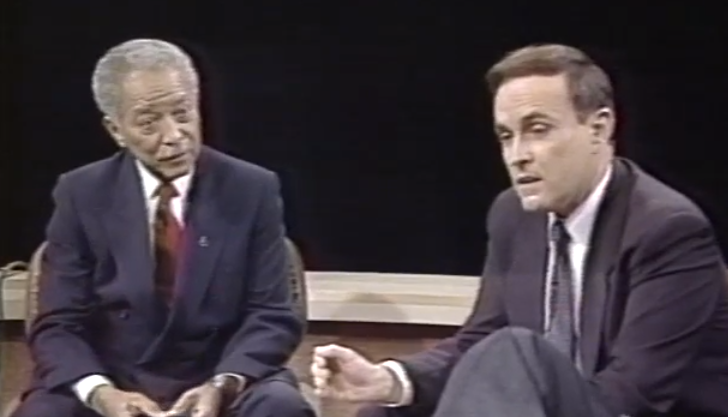
NBC4/C-SPAN
Then-Manhattan Borough President David Dinkins and former U.S. attorney Rudolph Giuliani debate during the 1989 race for mayor, which achieved 60 percent turnout — the highest of the city’s post-fiscal-crisis period.
Thirty years ago this summer, New York City was on the verge of an historic political season—the one that would see Manhattan Borough President David Dinkins defeat an incumbent mayor en route to becoming the city’s first Black chief executive before then or since.
That fact alone would make 1989 worth revisiting, but the moment offers even more for students of the city.
In some ways, 1989 marked the year that, a decade removed from the fiscal emergency of the seventies, a second wave of crisis began washing over New York City: red ink on the budget, a recession in the offing, years of rising crime finally triggering public alarm, crack’s ascendancy, AIDS becoming a leading killer.
The 1989 race also saw the retirement from public life of one iconic urban figure, three-term mayor Ed Koch, and the rise of another. Rudy Giuliani would likely have no place on the national stage today were it not for the way his first mayoral campaign ended: in a defeat so narrow that it allowed skeptics to question Dinkins’ mandate and instantly qualified the former prosecutor for a second bid.
And then there’s Dinkins himself—the dignified establishment operator who seemed perfectly happy as Manhattan BP and needed to be convinced that he should run to unseat Koch. Dinkins’ calm decency is likely what allowed him to win the mayoralty, but the accompanying lack of fiery passion or political killer instincts made him vulnerable in 1993 to a challenger always willing to shout loud enough.
Tom Robbins, at that point a veteran of City Limits and the New York Observer, saw the Dinkins years up close as a reporter at the Daily News. He wrote some tough takes on the 106th mayor, including shots at his work ethic, but says Dinkins now stands as his favorite mayor.
Both men joined WBAI’s Max & Murphy Show to look back on the ’89 race and the administration that followed. Hear our conversation below.
Get the best of City Limits news in your inbox.
Select any of our free weekly newsletters and stay informed on the latest policy-focused, independent news.
Of course, one other significance of 1989 is its role in shaping our current mayor, who worked in Dinkins’ administration and met his wife through that job, and who in 2013 ended the 20 years of Republican mayors that began with Dinkins’ loss in 1993. Both Democrats depended heavily on support from the Black community for winning office. Neither could claim the sharpest political skills. And Bill de Blasio’s foes have tried to paint his administration as a rerun of Dinkins’ failures, which have been inflated out of proportion to his successes.
In hindsight, some have given Dinkins a measure of the credit he was denied while in office for measures like Safe Streets, Safe City. One wonders how history will look upon de Blasio.








